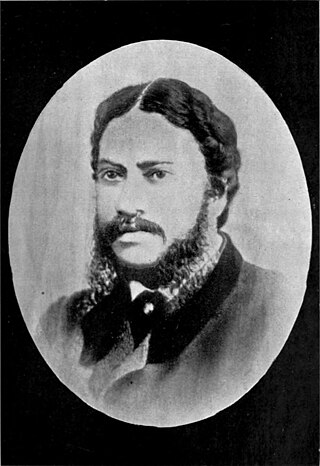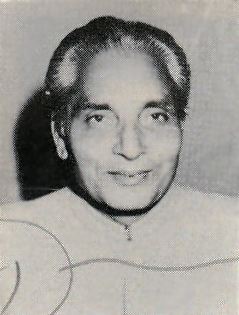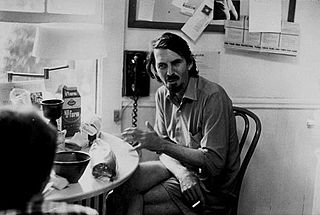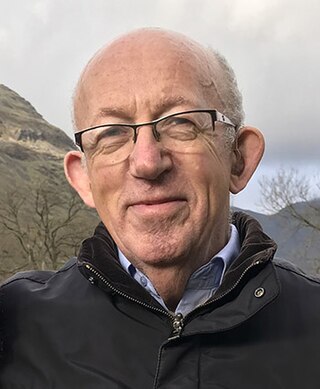
Li-Young Lee is an American poet. He was born in Jakarta, Indonesia, to Chinese parents. His maternal great-grandfather was Yuan Shikai, China's first Republican President, who attempted to make himself emperor. Lee's father, who was a personal physician to Mao Zedong while in China, relocated his family to Indonesia, where he helped found Gamaliel University. In 1959 the Lee family fled Indonesia to escape widespread anti-Chinese sentiment and after a five-year trek through Hong Kong and Japan, they settled in the United States in 1964. Li-Young Lee attended the University of Pittsburgh, the University of Arizona, and the State University of New York Brockport.

Michael Madhusudan Dutt was a Bengali poet and playwright. He is considered one of the pioneers of Bengali literature.

Vinayaka Krishna Gokak, abbreviated in Kannada as Vi. Kru. Gokak, was an Indian writer in the Kannada language and a scholar of English and Kannada literatures. He was the fifth writer to be honoured with the Jnanpith Award in 1990 for Kannada language, for his epic Bharatha Sindhu Rashmi. Bharatha Sindhu Rashmi deals with the Vedic age and is perhaps the longest epic narrative in any language in the 20th century. In 1961, Gokak was awarded the Padma Shri from the Government of India for Dyava Prithvi.

Eileen Myles is a LAMBDA Literary Award-winning American poet and writer who has produced more than twenty volumes of poetry, fiction, non-fiction, libretti, plays, and performance pieces over the last three decades. Novelist Dennis Cooper has described Myles as "one of the savviest and most restless intellects in contemporary literature." The Boston Globe described them as "that rare creature, a rock star of poetry." In 2012, Myles received a Guggenheim Fellowship to complete Afterglow, which gives both a real and fantastic account of a dog's life. Myles uses they/them pronouns.

Arun Balkrishna Kolatkar was an Indian poet who wrote in both Marathi and English. His poems are known for expressing the humour in everyday life. Kolatkar is the only Indian poet other than Kabir to be featured on the World Classics titles of New York Review of Books.

Jayanta Mahapatra was an Indian poet. He is the first Indian poet to win a Sahitya Akademi award for English poetry. He was the author of poems such as "Indian Summer" and "Hunger", which are regarded as classics in modern Indian English literature. He was awarded a Padma Shri, the fourth highest civilian honour in India in 2009, but he returned the award in 2015 to protest against rising intolerance in India.

Purushottama Lal, commonly known as P. Lal, was an Indian poet, author, translator, professor and publisher. He was the founder of publishing firm Writers Workshop in Calcutta, established in 1958.

Henry Louis Vivian Derozio was an Indian poet and assistant headmaster of Hindu College, Kolkata. He was a radical thinker of his time and one of the first Indian educators to disseminate Western learning and science among the young men of Bengal.

Chidananda Das Gupta —family name sometimes spelled 'Dashgupta' and 'Dasgupta'—was an Indian filmmaker, film critic, a film historian and one of the founders of Calcutta Film Society with Satyajit Ray in 1947. He lived and worked in Calcutta and Santiniketan.
Writers Workshop is a Kolkata-based literary publisher founded by the Indian poet and scholar Purushottama Lal in 1958. It has published many new Indian authors of post-independence urban literature. Many of these authors later became widely known.

Nationality words link to articles with information on the nation's poetry or literature.
Swadesh Bharati is a Hindi poet, recipient of "Premchand Award" and "Sahitya Bhushan Award". He lives in Kolkata from where he edits Rupambara, a literary bilingual quarterly journal. He has been in active field of creative writing since more than 45 years. He is chairman of Rashtriya Hindi Academy and was guest lecturer at Madaras Christian Academy.

Kamala Surayya , popularly known by her one-time pen name Madhavikutty and married name Kamala Das, was an Indian poet in English as well as an author in Malayalam from Kerala, India. Her fame in Kerala primarily stems from her short stories and autobiography, My Story, whereas her body of work in English, penned under the pseudonym Kamala Das, is renowned for its poems and candid autobiography. She was also a widely read columnist and wrote on diverse topics including women's issues, child care, politics, etc. Her liberal treatment of female sexuality, marked her as an iconoclast in popular culture of her generation. On 31 May 2009, aged 75, she died at Jehangir Hospital in Pune.

Pritish Nandy is an Indian poet, painter, journalist, parliamentarian, media and television personality, animal activist and maker of films, TV and streaming content. He was a parliamentarian in the Rajya Sabha from Maharashtra, elected on a ticket from the Shiv Sena. He is the author of forty books of poetry in English and has translated poems by other writers from Bengali, Urdu and Punjabi into English as well as a new version of the Isha Upanishad. Apart from these, he has authored books of stories and non fiction as well as three books of translations of classical love poetry from Sanskrit. He was Publishing Director of The Times of India Group and Editor of The Illustrated Weekly of India, The Independent, and Filmfare in the 1980s, all simultaneously. He has held six exhibitions of his paintings and calligraphy. He founded Pritish Nandy Communications Ltd, the content company, in 1993. He also founded People for Animals, India's first animal rights NGO which is currently run by co-founder Maneka Gandhi as chairperson.

Joe Winter is a British poet, literary critic and translator of poetry. A recent long poem is At the Tate Modern. His translations of the Bengali poets Rabindranath Tagore and Jibanananda Das are published by Carcanet Press, and his versions in modern English of the Anglo-Saxon epic Beowulf and the Middle English poem Pearl are with Sussex Academic Press. SAP has also published Two Loves I Have: a new reading of Shakespeare’s Sonnets and Hide Fox, and All After: What lies concealed in Shakespeare's 'Hamlet'?
Kabita Sinha (1931–1999) was a Bengali poet, novelist, feminist and radio director. She is noted for her modernist stance, rejecting the traditional housebound role for Bengali women, a theme echoed later in the work of other poets including Mallika Sengupta and Taslima Nasrin.

K. Srilata is an Indian poet, fiction writer, translator and academic based in Chennai. Her poem, In Santa Cruz, Diagnosed Home Sick won the First Prize in the All India Poetry Competition in 1998. She has also been awarded the Unisun British Council Poetry Award (2007) and the Charles Wallace writing residency at the University of Sterling (2010). Her debut novel Table for Four was long-listed in 2009 for the Man Asian Literary Prize and released in 2011.

Vihang A. Naik or Vihang Ashokbhai Naik is a modern bilingual poet from Gujarat, India. He has authored many collections of poetry in English and Gujarati, besides translating poems from Gujarati into English. He died in the year 2021.
Ketaki Kushari Dyson is a Bengali-born poet, novelist, playwright, translator and critic, diaspora writer and scholar. Born and educated in Calcutta (Kolkata), India, she has lived most of her adult life near Oxford, U.K. She writes in Bengali and English, on topics as wide-ranging as Bengal, England, the various diaspora, feminism and women's issues, cultural assimilation, multiculturalism, gastronomy, social and political topics.